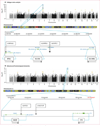Frontotemporal dementia and its subtypes: a genome-wide association study
- PMID: 24943344
- PMCID: PMC4112126
- DOI: 10.1016/S1474-4422(14)70065-1
Frontotemporal dementia and its subtypes: a genome-wide association study
Abstract
Background: Frontotemporal dementia (FTD) is a complex disorder characterised by a broad range of clinical manifestations, differential pathological signatures, and genetic variability. Mutations in three genes-MAPT, GRN, and C9orf72--have been associated with FTD. We sought to identify novel genetic risk loci associated with the disorder.
Methods: We did a two-stage genome-wide association study on clinical FTD, analysing samples from 3526 patients with FTD and 9402 healthy controls. To reduce genetic heterogeneity, all participants were of European ancestry. In the discovery phase (samples from 2154 patients with FTD and 4308 controls), we did separate association analyses for each FTD subtype (behavioural variant FTD, semantic dementia, progressive non-fluent aphasia, and FTD overlapping with motor neuron disease [FTD-MND]), followed by a meta-analysis of the entire dataset. We carried forward replication of the novel suggestive loci in an independent sample series (samples from 1372 patients and 5094 controls) and then did joint phase and brain expression and methylation quantitative trait loci analyses for the associated (p<5 × 10(-8)) single-nucleotide polymorphisms.
Findings: We identified novel associations exceeding the genome-wide significance threshold (p<5 × 10(-8)). Combined (joint) analyses of discovery and replication phases showed genome-wide significant association at 6p21.3, HLA locus (immune system), for rs9268877 (p=1·05 × 10(-8); odds ratio=1·204 [95% CI 1·11-1·30]), rs9268856 (p=5·51 × 10(-9); 0·809 [0·76-0·86]) and rs1980493 (p value=1·57 × 10(-8), 0·775 [0·69-0·86]) in the entire cohort. We also identified a potential novel locus at 11q14, encompassing RAB38/CTSC (the transcripts of which are related to lysosomal biology), for the behavioural FTD subtype for which joint analyses showed suggestive association for rs302668 (p=2·44 × 10(-7); 0·814 [0·71-0·92]). Analysis of expression and methylation quantitative trait loci data suggested that these loci might affect expression and methylation in cis.
Interpretation: Our findings suggest that immune system processes (link to 6p21.3) and possibly lysosomal and autophagy pathways (link to 11q14) are potentially involved in FTD. Our findings need to be replicated to better define the association of the newly identified loci with disease and to shed light on the pathomechanisms contributing to FTD.
Funding: The National Institute of Neurological Disorders and Stroke and National Institute on Aging, the Wellcome/MRC Centre on Parkinson's disease, Alzheimer's Research UK, and Texas Tech University Health Sciences Center.
Copyright © 2014 Elsevier Ltd. All rights reserved.
Conflict of interest statement
RF, DGH, MAN, JDR, AR, JBJK, CDS, WSB, GMH, JRH, OP, LB, ET, EH, IH, AR, MB, BB, AP, CC, NJC, LB, GB, RG, GF, DG, CF, MS, ES, JC, AL, RB, MLW, KN, CN, IRAM, GYRH, DMAM, JG, CMM, JA, TDG, IGM, AJT, PP, EDH, EMW, AB, EJ, MCT, PP, CR, SOC, EA, RP, JDS, PA, AK, IR, ER, LP, ER, PStGH, GR, FT, GG, JBR, JCMS, JU, JC, SM, AD, VMVD, MG, JQT, JvdZ, WD, TVL, SFC, ILB, DH, VG, MV, AB, BN, SS, SB, IP, JEN, LEH, MR, MM, BI, GG, SP, WG, MNR, NCF, JDW, MGS, HRM, PR, PH, JSS, SR, AR, AG, ACB, RM, FF, CC, LB, MA, MG, MEC, NS, MB, KAJ, JEP, WWS, AMK, HR, JCvS, EGPD, HS, YALP, PS, GL, RC, VN, AAP, MF, AP, GM, PS, MK, HHC, CG, FP, AR, VD, FL, DK, LF, SPB, JH, PM, and ABS declare no competing interests.
Figures


Comment in
-
Genome-wide association study in FTD: divide to conquer.Lancet Neurol. 2014 Jul;13(7):643-4. doi: 10.1016/S1474-4422(14)70070-5. Lancet Neurol. 2014. PMID: 24943334 No abstract available.
References
Publication types
MeSH terms
Grants and funding
- P50AG023501/AG/NIA NIH HHS/United States
- P50AG016574/AG/NIA NIH HHS/United States
- AG010124/AG/NIA NIH HHS/United States
- P50 NS072187/NS/NINDS NIH HHS/United States
- 091681/WT_/Wellcome Trust/United Kingdom
- R01 AG026251/AG/NIA NIH HHS/United States
- P30 NS069329/NS/NINDS NIH HHS/United States
- 100140/WT_/Wellcome Trust/United Kingdom
- 081864/WT_/Wellcome Trust/United Kingdom
- R01 NS076837/NS/NINDS NIH HHS/United States
- G0901254/MRC_/Medical Research Council/United Kingdom
- R01 NS044266/NS/NINDS NIH HHS/United States
- P01 AG032953/AG/NIA NIH HHS/United States
- MR/L016451/1/MRC_/Medical Research Council/United Kingdom
- MC_U123192748/MRC_/Medical Research Council/United Kingdom
- P50 AG05681/AG/NIA NIH HHS/United States
- P30 AG010124/AG/NIA NIH HHS/United States
- P50 AG023501/AG/NIA NIH HHS/United States
- 089701/WT_/Wellcome Trust/United Kingdom
- Z01 AG000932/ImNIH/Intramural NIH HHS/United States
- P50 NS72187/NS/NINDS NIH HHS/United States
- ZIA AG000932-04/AG/NIA NIH HHS/United States
- P50 AG016574/AG/NIA NIH HHS/United States
- P01 AG017586/AG/NIA NIH HHS/United States
- AG017586/AG/NIA NIH HHS/United States
- MC_U123160651/MRC_/Medical Research Council/United Kingdom
- G1100643/MRC_/Medical Research Council/United Kingdom
- R01 NS076471/NS/NINDS NIH HHS/United States
- P50NS072187/NS/NINDS NIH HHS/United States
- CAPMC/ CIHR/Canada
- P01 AG003991/AG/NIA NIH HHS/United States
- P50 AG005681/AG/NIA NIH HHS/United States
- P01 AG026276/AG/NIA NIH HHS/United States
- MC_U105597119/MRC_/Medical Research Council/United Kingdom
- P01 AG03991/AG/NIA NIH HHS/United States
- G0301152/MRC_/Medical Research Council/United Kingdom
- G0400074/MRC_/Medical Research Council/United Kingdom
- G0900652/MRC_/Medical Research Council/United Kingdom
- 089703/WT_/Wellcome Trust/United Kingdom
- P01 AG019724/AG/NIA NIH HHS/United States
- G0502157/MRC_/Medical Research Council/United Kingdom
- R01 AG032306/AG/NIA NIH HHS/United States
- G0701441/MRC_/Medical Research Council/United Kingdom
- P30-NS069329-01/NS/NINDS NIH HHS/United States
- AG019724/AG/NIA NIH HHS/United States
- MR/J009482/1/MRC_/Medical Research Council/United Kingdom
- R01 AG041797/AG/NIA NIH HHS/United States
- AG032953/AG/NIA NIH HHS/United States
- R01 NS065782/NS/NINDS NIH HHS/United States
- R01 AG037491/AG/NIA NIH HHS/United States
- AG032306/AG/NIA NIH HHS/United States
- 088324/WT_/Wellcome Trust/United Kingdom
- MR/K006584/1/MRC_/Medical Research Council/United Kingdom
- G1100540/MRC_/Medical Research Council/United Kingdom
- P01 AG003949/AG/NIA NIH HHS/United States
- AG023501/AG/NIA NIH HHS/United States
- U01 AG006786/AG/NIA NIH HHS/United States
- K23 AG000932/AG/NIA NIH HHS/United States
- P01AG019724/AG/NIA NIH HHS/United States
- NS044266/NS/NINDS NIH HHS/United States
- G0700943/MRC_/Medical Research Council/United Kingdom
- R01 NS080882/NS/NINDS NIH HHS/United States
- G0802462/MRC_/Medical Research Council/United Kingdom
LinkOut - more resources
Full Text Sources
Other Literature Sources
Research Materials
Miscellaneous

